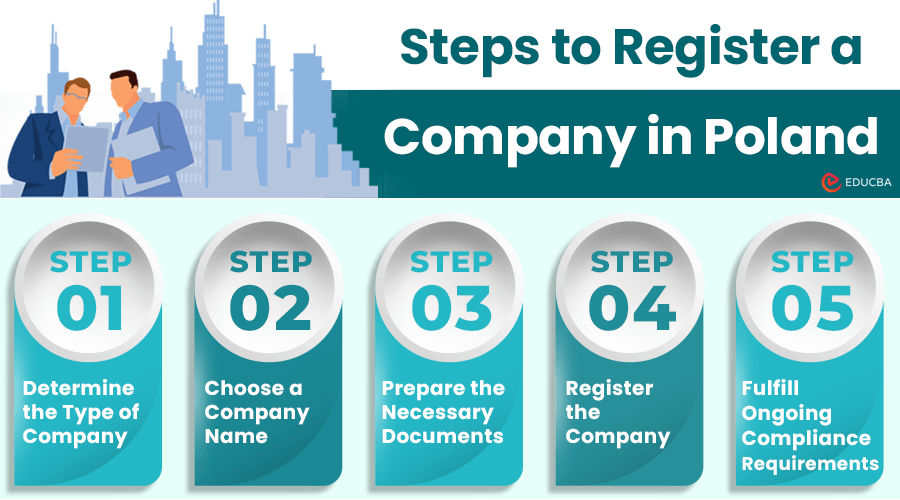How Easy is it to Register a Company in Poland?
You could be a local entrepreneur or an international investor looking to expand your business into the Polish market. Either way, understanding the registration requirements and procedures is essential for a smooth and hassle-free experience. However, the process to register a company in Poland can be overwhelming.
This detailed guide provides a clear, step-by-step roadmap to register a company in Poland easily.
Stepwise Guide to Register a Company in Poland
Follow this concise yet comprehensive guide to streamline the process of how you register a company in Poland.
Step #1: Determine the Type of Company
The first step in company registration in Poland is to determine the type of legal entity you want to establish. The most common types of companies in Poland include:
- Limited Liability Company – Known as Spółka z ograniczoną odpowiedzialnością (Sp. z o.o) in Poland.
- Joint-Stock Company – Known as Spółka akcyjna (S.A.) in Poland.
- Sole Proprietorship – Known as Jednoosobowa działalność gospodarcza (JDG) in Poland.
Each type of company has its own set of advantages, tax implications, and legal requirements. So, it’s important to carefully consider your business needs and objectives before deciding.
Step #2: Choose a Company Name
Once you determine the type of company you want to establish, the next step is to choose a unique company name. The name should not be identical or similar to any existing company name. Thus, before finalizing your company name, conduct a thorough search in the National Court Register (Krajowy Rejestr Sądowy – KRS) database to ensure its availability.
Additionally, it must comply with Polish law and not contain offensive or misleading language. You can also reserve the chosen name for up to six months, giving you time to complete the registration process.
Step #3: Prepare the Necessary Documents
To register a company in Poland, you need to prepare and submit several documents to the relevant authorities. The requirements can vary from one type of company to another. However, generally, you need the following:
- Articles of Association: This document outlines the company’s name, registered office address, share capital, shareholders’ details, and other essential information.
- Statement of Incorporation: A formal declaration signed by all shareholders confirming their intention to establish the company and comply with legal requirements.
- Identification Documents: Copies of identification documents (e.g., passports or ID cards) for all shareholders and appointed company representatives.
- Proof of Registered Office: Evidence of the company’s registered office address in Poland, such as a lease agreement or utility bill.
- Shareholders’ Agreement (Optional): If applicable, a shareholders’ agreement outlines the shareholders’ rights and obligations toward the company’s management.
It’s crucial to ensure that all documents are accurate, complete, and comply with Polish legal requirements to avoid delays or complications during the registration process.
Step #4: Register the Company
With the essential documents prepared, the next step is to register the company with the appropriate authorities in Poland. The National Court Register (KRS) typically conducts the registration process. It involves the following steps:
- Submission of Documents: Submit the documents to the KRS office or to the Central Electronic System for Legal Entities (CEIDG) for sole proprietorships.
- Payment of Fees: Determine and Pay the registration fees, which vary depending on the company type and the share capital amount.
- Review and Approval: KRS or CEIDG will review the submitted documents and will officially register the company if everything is in order.
- Obtain Registration Number: Upon successful registration, the National Court Register office will assign your company a unique registration number and enter it into its official register.
- Publication in the Official Gazette: The KRS will then publish a notice of the company’s registration in the National Court Register Bulletin (Biuletyn Informacji Publicznej).
After successful registration, the company becomes a separate legal entity capable of conducting business activities, entering into contracts, and acquiring rights and obligations in its own name.
Step #5: Fulfill Ongoing Compliance Requirements
After successfully registering the company, you must meet several ongoing compliance requirements to maintain its legal status and good standing. These may include:
- Annual Financial Statements: Prepare and submit annual financial statements in accordance with Polish accounting standards.
- Tax Filings: File regular tax returns and comply with applicable tax regulations, including VAT, corporate income tax, and payroll taxes.
- Shareholder Meetings: Hold regular shareholders meetings and properly document decisions and resolutions.
- Reporting Obligations: Fulfill reporting obligations to the National Court Register, including updating company details or changing corporate structure.
- Compliance with Regulations: Make sure you comply with relevant laws and regulations governing the company’s industry, operations, and corporate governance.
Adhering to these ongoing compliance requirements can ensure that your company maintains a good image and avoids potential penalties or legal issues.
Final Thoughts
To register a company in Poland may seem daunting, but with the right guidance and understanding, the process can be manageable and straightforward. You can confidently navigate the process of company registration in Poland by using this guide.
Recommended Articles
We hope this EDUCBA stepwise guide simplifies your understanding of how you can register a company in Poland. If you want to learn about similar concepts, visit the following recommendations.


